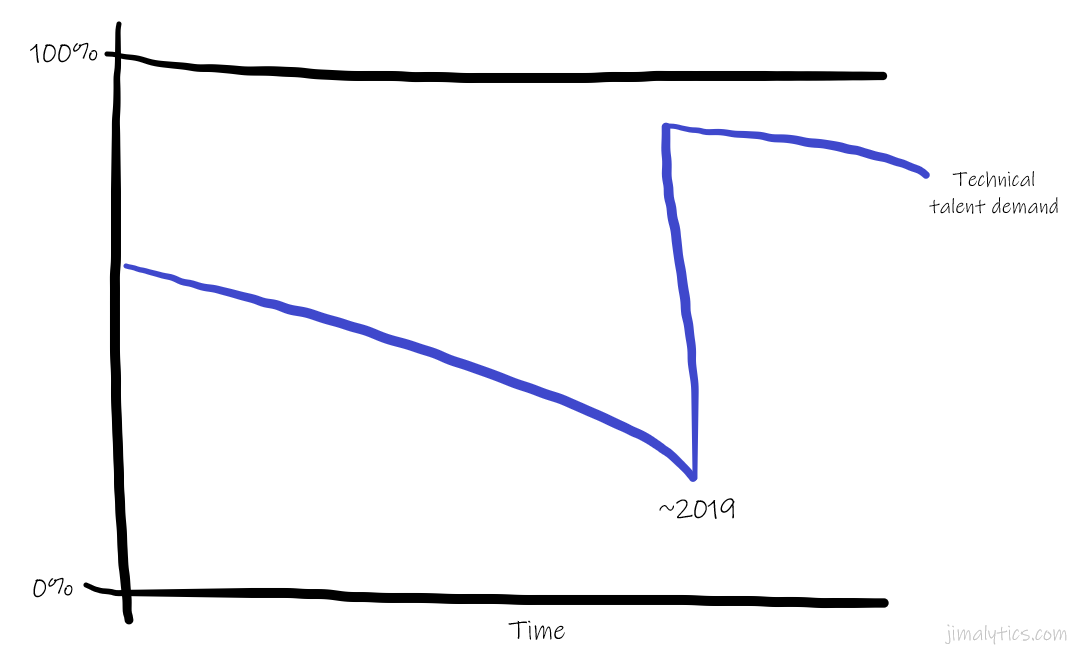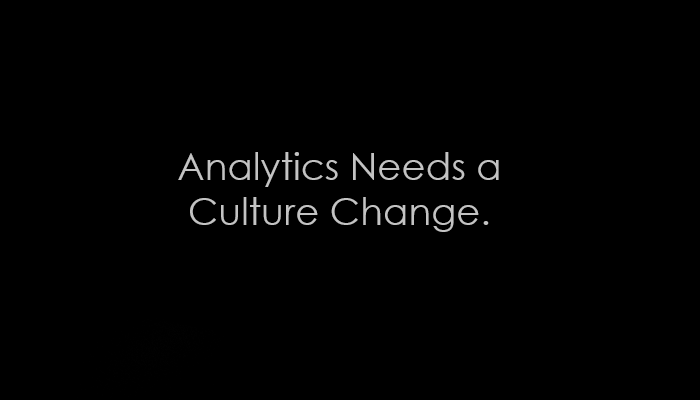This is a tough one. It’s difficult to take a critical look at your career – your life – over the past 20 years and see the direction of an industry pivot in a direction that forces you to take a step back and ask whether it is sustainable. A lot has changed over the past 4 or 5 years. I feel like I’m screaming into the wind here. For its entire existence, we’ve been trying to shift the mindset our industry from one that focuses on collecting data to one that uses data to make decisions. Over these past several years, we’ve collectively taken huge steps backward.
Let’s get past the caveats. Has everyone regressed? No, but let’s consider the trends over the past few years. The main topics fall into these categories: new platforms, BI/data science, and privacy. With the exception of privacy, these can all ADD value (privacy prevents loss). However, you have to have the culture to support these. Note that I didn’t say you had to have the tech. I didn’t say you had to have the tracking depth or governance; nor did I say you had to have data volume or algorithms mastered. You have to have the culture to add value to your analytics program.
(Also, if you haven’t already read my last article – I highly recommend doing so. This parlays off of the ideas I put forward there.)
What the hell is happening to the culture?
That’s why this article is tough. It’s relative. Who knows? Maybe I’m the problem. Having served this industry for the majority of my life, I feel like I have a decent grip on its gaps, opportunities, and trends. In short, if you doubt my credibility you won’t like the rest of this article. I don’t want to convince you that what you’re doing is meaningless or that there’s no hope. There is plenty of opportunity today, just as there will be tomorrow! What’s alarming is that while the opportunity exists, its scope and scale remain the same.
The biggest red flag I see is that everything is getting more technical. Traditionally, analytics roles straddle business/marketing/technical expertise. With GA4, the first thing you hear is “Well, have you hooked it into BigQuery?” BQ is a great tool and incredibly powerful, but this is a great example of a critical layer of abstraction from the business. This is fine if teams are growing to adequately fill the abstraction gap. That’s not happening. New privacy regulations? Nah, we don’t need new headcount. Migrate from UA to Adobe Analytics? The team can handle it. These are all things we do, but chip away at our ability to actually grow the business. Inevitably, our time is entirely spent reacting to these changes:

We do not want higher demand for technical talent. We want technical talent demand to be steadily low! A lot of progress was made chipping away at this ratio so we could focus on enacting substantive change. When the ratio flips, we’re back in the stone age. We hire highly motivated craftspeople to build a work of art, but do not know why they’re doing it. It’s asinine.
Before every article I write, I try to articulate a clear mission – what do I want people to get out of this? How do I want them to change as an outcome? For this article, I wanted to sound an alarm that I hope others can repeat. We need to take a step back – to raise the bar for hiring. We should be focusing on the business and let this insane technical whack-a-mole take a back seat.
Final Thoughts
We need to collectively change. Now. I’m risking sounding naïve here, but implementing a data layer gets you cleaner data. That’s it. Solving for privacy will keep you from getting sued. That’s it. Upgrading to Google Analytics 4 or any new analytics platform means your data now appears in a new interface. That’s it. There are REAL implications for not tackling this, but I honestly think we would progress farther as an industry if we ditched cookies, analyzed raw server logs, and moved on.
At the end of the day, it doesn’t matter what car you drive if the only place you’re going is the grocery store. Right now, investment is melting into upgrades to this car. If you want to spend your entire career as a mechanic who installs cosmetic upgrades to minivans, you can do that. However, companies aren’t only a function of technology but (more importantly) a function of people and purpose. We’re falling behind because we’re chasing technology instead of focusing on mastering the other 2 functions. Our industry will continue to take steps backward if the only problems we’re solving are technical problems.

Hello Jim,
Thank you for this blog post. I see a lot of work in the technical details but when we get to a good analytics installation, only a few are looking at the metrics, and that too only counts of conversions or events. We have lots of data but maybe this glut stultifies the need to analyse. I hope the new AI tools( yes more tech stuff) will free us to seek meaning from all our data. Thanks so much for your thoughts!
You are right!
Now, to get this happening, join Purposeful Analysts and join people turning the ship rather than riding it.
https://coresciences.notion.site/Purposeful-Analysts-406f1409249c428d8da09f36836c9889?pvs=4
Hope to see everyone there!
Main request for Analysts: We need CLEANER data!!
Ok, a reasonable request. Technically very challenging, but a reasonable goal. Too often when I ask:
“what are you going to do with this cleaner data?”,
the response is “really cool stuff!!”.
“Like what?”
“well, you know, really cool stuff like personalization and machine learning and AI, and… well.. really cool stuff”
“Have you started building out any of that really cool stuff yet?”
“We have plans, but we need clean data first!”
“Why do you need super clean data before you start building it out? Can’t you build it out using current data, so it’s ready to run when (if) you get clean data?”
“But… we need clean data first!”
“Can you give me an example of this really cool stuff?
“Yes!! We can build a dashboard telling the Product teams if their traffic is going up or down!”
“Ya, that is ‘really cool stuff’, which people have been doing for about 20 years in Digital.”
“Well… maybe, but we can do other cool stuff too!”
“LIke what? Getting super clean data is HARD and EXPENSIVE across the board, so it would help if I could start to narrow in on certain types of data first. That will give you at least some of that clean data you say you need to build your Super Cool Stuff.”
“We need it ALL! It’s ALL important!!”
“OK, maybe, but we need to start somewhere. So could you please give us a priorty list of the data?”
“We need it ALL because our super cool plans are to combine it ALL into this super complex algorythm that is so complex you wouldn’t understand it if I tried to explain it to you!”
“Are your stakeholders asking for this super complicated all encompassing data modeling?”
“Well… no. They usually just want to anser some more basic questions to help them decide on how to evolve and grow their Product.”
“Are you providing that info to them?”
“Well… it’s hard to because we are planning out this Super Cool Advanced reporting that we will will someday provide to them once we have super clean data!”
“……………… I’ll see what I can do to work on getting cleaner data……”